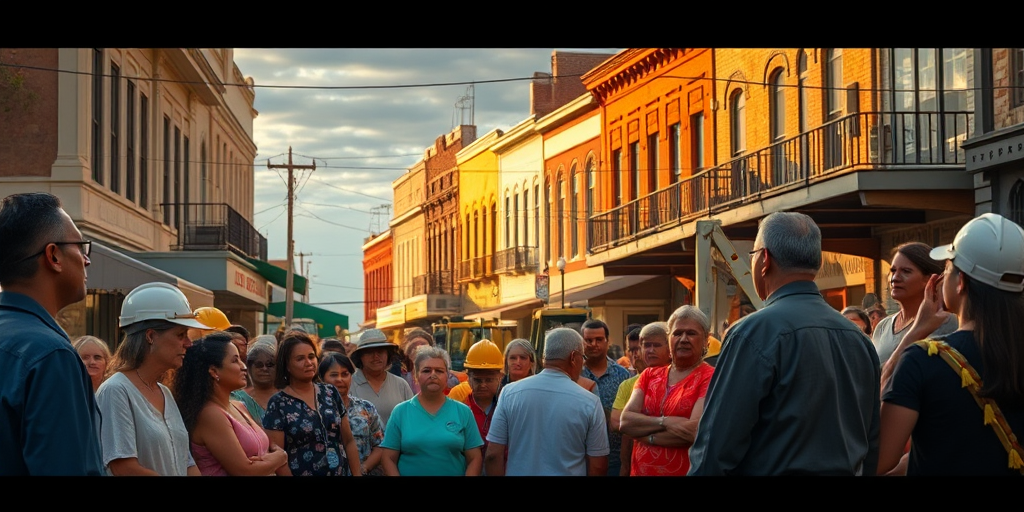Mercedes: Sewage Facilities Urgently Require Overhaul
Residents of Mercedes, a key community in the thriving Rio Grande Valley (RGV), are witnessing significant steps towards improving the city’s under-strain sewage infrastructure, as local officials rally to address the systemic issues that have spurred multiple state violations. The city recently secured a $10 million grant from the Texas Water Development Board, aimed at overhauling the aging facilities, with further efforts underway to garner additional funding for comprehensive upgrades.
Revamping Mercedes’ Overworked Sewage System
The Mercedes sewage facilities have long been overwhelmed by the increasing demands of a growing population and expanding infrastructure. These facilities, including several key lift stations critical for transporting wastewater, have failed to meet state standards, prompting efforts to mitigate the violations through modernization and replacement projects.
City Manager Alberto Perez has been at the forefront of these initiatives, seeking solutions to tackle the pressing infrastructure needs. “We’ve identified several lift stations that require immediate attention,” Perez explained. “With the $10 million grant now secured, we can begin to address these concerns within the next three to six months.”
The grant, which does not require repayment, will be instrumental in replacing outdated equipment and shoring up the current wastewater treatment infrastructure. However, the need for further improvements has led Perez and city officials to explore additional funding sources, as they plan to request an extra $13 million from state resources to support a more extensive rehabilitation.
Local Impact: Ensuring Sustainable Growth
The significance of this development cannot be overstated for Valley residents, as the ongoing issues with sewage facilities have been a growing concern. For a community that continues to see new residential and commercial developments, such infrastructure challenges pose a barrier to sustained growth.
Erin Ozuna, a local business owner, highlighted the importance of these improvements. “We’ve seen more houses and businesses pop up in our area,” Ozuna said. “Ensuring that our city’s infrastructure can support this growth is a fundamental part of maintaining Mercedes as an attractive place for new investment.”
For local leaders, addressing these infrastructure demands serves not only as a means of adhering to regulatory requirements but also as a critical step in fulfilling their commitment to residents’ quality of life and public health. Enhanced sewage systems will provide the necessary foundation for safe, reliable operations that align with the city’s long-term development goals.
Historical Context and Future Implications
Historically, infrastructure challenges have been consistent hurdles for the RGV. Communities within South Texas often grapple with outdated facilities that struggle to accommodate growing populations and economic development. The case of Mercedes is emblematic of broader infrastructure issues faced across the region.
Previous efforts to address such challenges have seen variable success, often limited by financial constraints and prolonged timelines. However, the recent allocation of state resources signals a proactive approach towards resolving these issues, embracing strategic investments crucial for cities like Mercedes.
Looking forward, successfully upgrading Mercedes’ sewage facilities is expected to set a precedent for infrastructure revitalization efforts across the Valley. This could lead to increased collaboration between local governments and the state, fostering a more resilient and sustainable approach to public works projects.
However, while these improvements are promising, they prompt further dialogue about ensuring sustained infrastructure investments that align with future growth projections. As such developments unfold, maintaining a balanced approach is vital to ensuring community resources are used effectively without compromising fiscal responsibilities.
Community Resources and Engagement
In anticipation of ongoing projects, city officials are committed to providing residents with accurate and timely information. Community members are encouraged to engage with local forums and reach out to city representatives to learn more about the impact of the upcoming sewage facility improvements.
Mercedes residents can contact City Hall for additional resources or inquiries regarding the project timeline and its expected outcomes. Moreover, the city plans to hold public meetings to discuss future infrastructure initiatives and solicit feedback, ensuring community interests remain a central focus throughout the process.
Conclusion
The commitment to modernizing Mercedes’ sewage infrastructure reflects a broader vision for sustainable development within the Rio Grande Valley. By securing essential funding and embarking on targeted improvements, city officials are exemplifying their dedication to tackling foundational challenges head-on.
For Valley residents, these developments represent more than just compliance with state regulations—they signal a concerted effort to enhance the local quality of life, promote public health, and assure the community’s future vitality. With continued support and engagement from residents, Mercedes stands poised to emerge stronger and better equipped to navigate the path of growth ahead.







